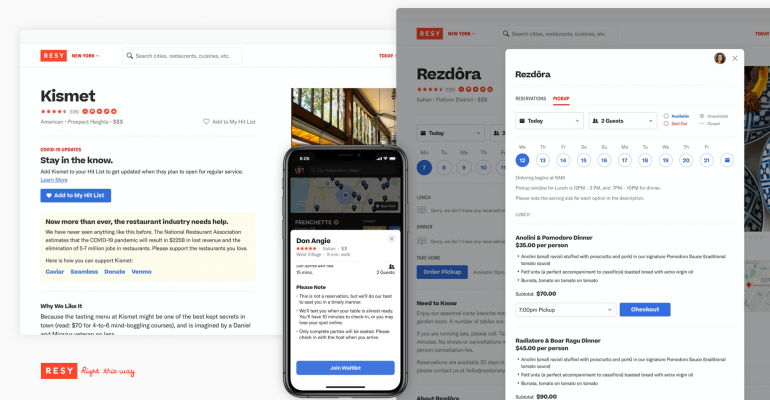Reservation systems will become a key way for restaurants to manage physical distancing within their dining rooms when in-dining restrictions are lifted across the U.S. following the coronavirus pandemic.
Various platforms such as Resy and OpenTable are providing restaurants relief to ease the challenges of reopening dining rooms with limited seating capacity.
OpenTable, often criticized for its steep cover fees, has introduced a new “Open Door” pricing program for both new and existing restaurants. The program features no subscription fees through the end of the year; no cover fees through Sept. 30, 2020; and up to 50% off on cover fees in the fourth quarter of 2020.
“OpenTable is committed to supporting the restaurant community and we recognize the road to recovery will be long and difficult,” the company said.
OpenTable has nearly 60,000 restaurants on its platform. To get the Open Door offer, participating restaurants must commit to an OpenTable plan subscription through Dec. 31, 2021.
Rival reservation platform Resy is also waiving fees for new and existing restaurants.
Resy’s fee waiver, however, is through the end of the year.
The company said it has adapted its platform for a new normal of dining that will force restaurants to manage limited capacity floor plans.
Online ordering platform Tabit has added delivery to its suite of services. It is free as part of the brand's Covid-19 relief initiative.
Online Ordering Providers Pivot to Delivery
A number of digital ordering platforms are adjusting their systems to cater to the growing demand for contactless ordering.
Some are also taking a slice of the already hyper-competitive third-party delivery space.
Miami-based online ordering platform Tabit, for example, began promoting its last-mile delivery service. The company is offering its online ordering system free to restaurants for six months during the COVID 19 crisis. The service includes TabitWheels, a dispatch service for restaurants that want to offer delivery without paying “the exorbitant fee to the aggregators,” the company announced last week.
Other larger platforms have been in this space for awhile, including Olo. The company's Olo Dispatch allows a restaurant to have a branded-delivery channel without going through a third-party marketplace. The fees are typically smaller because restaurants don't have to leverage the marketplace of a third-party delivery company.
Direct delivery also allows restaurants to keep valuable consumer data.
“Tabit is awesome – flexible, mobile and adaptable,” Brent Johnson, owner of a handful of Rio Mambo restaurants in Texas, said in a statement. “We would have been underwater in this new curbside/delivery model without Tabit.”
Yelp adding 'curbside' filter
Yelp is also adapting its user interface to help restaurants promote off-premise ordering.
The company recently announced plans to add “curbside pickup” as a searchable term in the app so consumers can easily sort for businesses that offer this service including restaurants.
Curbside has grown in popularity as consumers look to avoid contact when ordering food.
Yelp said some restaurants have changed how they use existing Yelp services including Yelp Waitlist and Reservations. Chili’s Grill & Bar, for example, has been using Yelp Waitlist to help manage curbside takeout orders.
Chili’s is tracking guests picking up their curbside orders from their vehicle by adding “table numbers” on parking spots to create a seamless curbside experience, Yelp said.
For our most up-to-date coverage, visit the coronavirus homepage.
Learn how consumer trends are shifting during COVID-19 from our panel of experts on Thursday, May 7.
Contact Nancy Luna at [email protected]
Follow her on Twitter: @fastfoodmaven






